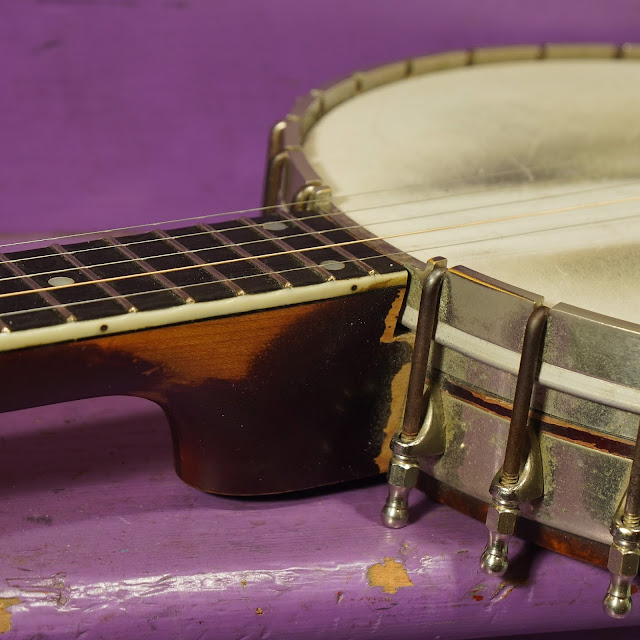1961 Vega "Pete Seeger" Longneck 5-String Banjo
From doing sound for events in Hancock, VT, I've gotten to know some of the extended Seeger family up this way. They're all wonderful and dang do they keep busy. This is true.
This banjo is owned by Mr. Tony Seeger, nephew of the famed Mr. Rainbow Quest Pete himself, and it was gifted to Tony after he graduated, so goes the family gossip. It's a '61, Boston-made instrument and has nice, vintage-style appointments -- a dowel-stick construction through the rim and Tubaphone tonering being the main "lusty-looks" ones.
Of course, it also has the absurdly-long neck with its 32 1/8" or so scale length as well, allowing a standard set of banjo strings to tune down to open E below normal G pitch as its "standard" tuning. That makes it a heck of a lot easier to play with guitar and then capo into whatever key you need to pluck along with folksingers and their wants.
I may have been after Tony to get it refretted for a few years, now. He's played the heck out of this instrument. The frets in the center of the neck looked like they'd been in a war zone and meant that the action had to be higher than necessary to get clean notes out of them when slipping the capo on and off.
Thankfully, he let me have it here for some time so I could get-around to refretting it. Post-refret and a fresh setup, it's sounding rich, full, and muscular again. I mean -- these are great-sounding tonerings. A lot of people expect an "old time' tonering like a Tubaphone to be mellow and sultry or something, but that's purely because most people using them these days don't crank the head down tight "as god intended" or stick massive piles of damping material behind the dowel. When these are played "wide open" they're bright, poppy, driving, and loud as a Lange. It's good stuff and perfect for leading folksongs in a group setting.
And -- let's admit it -- that's where this belongs.
So -- thank you Tony for letting me borrow it for a bit. It put a smile on my face to hear it back in order again. Also -- folks, do check out his conversations on YouTube via his ethnomusicology work at UCLA. I got sidetracked into a few of them while I was working on this the other night. That's also good stuff.




















Comments